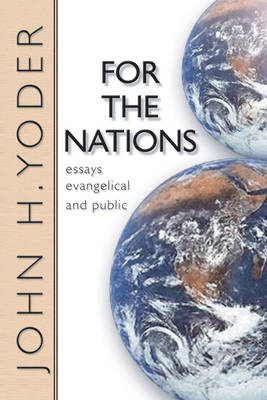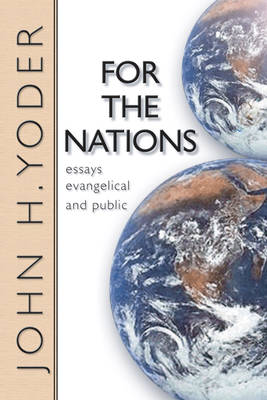
Bedankt voor het vertrouwen het afgelopen jaar! Om jou te bedanken bieden we GRATIS verzending (in België) aan op alles gedurende de hele maand januari.
- Afhalen na 1 uur in een winkel met voorraad
- In januari gratis thuislevering in België
- Ruim aanbod met 7 miljoen producten
Bedankt voor het vertrouwen het afgelopen jaar! Om jou te bedanken bieden we GRATIS verzending (in België) aan op alles gedurende de hele maand januari.
- Afhalen na 1 uur in een winkel met voorraad
- In januari gratis thuislevering in België
- Ruim aanbod met 7 miljoen producten
Zoeken
Omschrijving
This book is a masterwork from a master theological craftsman. John Howard Yoder is perhaps the best worker in Christian theology in America today, though his modesty (and others' presumption) still hides his accomplishment from some. Here, answering the question raised by The Politics of Jesus, Yoder addresses the major challenge facing American churches--the authentic mode of Christian existence in society today. In full command of his material, Yoder provides a powerfully stated, radically catholic answer. --James Wm. McClendon Jr. Fuller Theological Seminary It has been Yoder's vocation to proclaim a gospel of biblical realism that challenges both the biblicism of many other self-identified 'evangelicals' and the pretenses of 'political realism' of many of his theological and secular contemporaries. He has insisted on a coherent witness that is at once 'sectarian' and 'catholic, ' even while it celebrates both the diaspora of Judaism-become-Christianity and the radical New Testament theology of the cross. These essays from several decades all testify to 'the politics of Jesus' that transforms conventional assumptions about both power and weakness. They combine to offer what Yoder calls 'one holistic, Christological, paradigmatic proclamation: servanthood, enemy love, forgiveness. --Alan Geyer Wesley Theological Seminar
Specificaties
Betrokkenen
- Auteur(s):
- Uitgeverij:
Inhoud
- Aantal bladzijden:
- 258
- Taal:
- Engels
Eigenschappen
- Productcode (EAN):
- 9781592440849
- Verschijningsdatum:
- 25/10/2002
- Uitvoering:
- Paperback
- Formaat:
- Trade paperback (VS)
- Afmetingen:
- 147 mm x 218 mm
- Gewicht:
- 331 g

Alleen bij Standaard Boekhandel
+ 88 punten op je klantenkaart van Standaard Boekhandel
Beoordelingen
We publiceren alleen reviews die voldoen aan de voorwaarden voor reviews. Bekijk onze voorwaarden voor reviews.









